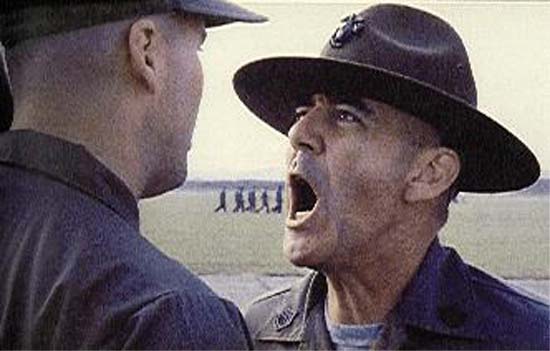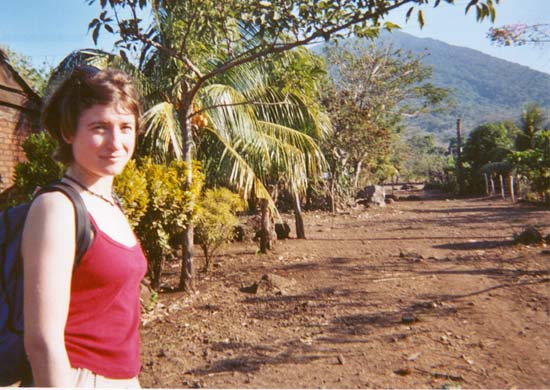
| By Admin1 (admin) on Friday, June 06, 2003 - 3:55 pm: Edit Post |
Marine Staff Sergeant says the Peace Corps is "truly hardcore"



| By Ron Green on Tuesday, June 10, 2003 - 10:50 am: Edit Post |
Our friend Marine SSgt McCurtis failed to notice there was plenty of support around his daughter. Perhaps not the logistical sort, brought by helicopter, but the interpersonal sort brought in by his daughter's attitude, personal ability and communication skills.
His daughter seemed to be in a village -- sure a small one, but a village nonethless. There are people there. That's where people live.
The whole point of a Peace Corps experience is not one of "my buddies and I against an enemy" familiar to veterans. His daughter and thousands of other Volunteer bring only themselves, backed by training and native ability to identify and assist in resolving issues at the community level. No defensive perimeters surround literacy; no rifle company could defeat malnutrition.
It's a different world where Volunteers are the most effective. They tend to take democratic values with them, rather than dropping them from a B-52 or loading them into a Tomahawk.
Ron Green
Panama 13, 1966-69
| By Christopher Coppenbarger on Tuesday, June 10, 2003 - 11:16 am: Edit Post |
I once had a Marine living in my host country tell me that Marines led a good life and that Peace Corps volunteers were 'hard core'. After all, working for the Embassy put the 8 Marines in a beautful house-complete with pool, pool house, weight room, game room, basketball and volleyball court, cooks, servants, and so much more.
Many of the Peace Corps Volunteers led lives in remote parts of the country, suffering a great many hardships, from the physical to the mental, and from lack of luxuries to lack of necessities. Even to this day, I still haven't told my mother 'everything that happened.'
However, the day of the US Embassy bombing in Dar Es Salaam, Tanzania (I was down the street) showed the greatness of both PCVs and Marines as they helped those who had been injured to escape the rubble of the Embassy compound.
As the expat community was taken to the Charge de affairs' house, I heard the Marine gunnery sgt. bark 'If you see anyone around the perimeter of the house, inform me immediately, and WE will remedy the situation."
The 'WE', of course, were the Marines, not Peace Corps volunteers. It was at this time of fear and anxiety for all, a time when people we all knew died or were injured, a time when every person waited for a second attack, that I realized who was prepared to risk there lives to defend mine and my fellow Peace Corps volunteers. That to me showed that the Marines were the ones who were 'truly hardcore.'
Christopher Coppenbarger
Tanzania, 97'-99'
| By Lauren Keinath on Friday, June 20, 2003 - 10:01 am: Edit Post |
This is an interesting article. My son is a Marine (Okinawa), my daughter is a PCV (Nepal). When I tell people this, one of the first reactions is invariably, "Oh wow -- what different choices!"
And, I have to point out that they aren't so different, but that is hard for anyone outside the military or the PC experiences to see. Both of them have chosen paths that serve others besides themselves; paths that are extremely challenging physically, mentally, emotionally; and which have stretched them both in ways they did not expect.
And, as Christopher noted above, there is a need, and a time and place for each of them. My daughter likened it once to being on different parts of a continuum.... there are times when the work that PC does is what is needed, there are times when the Marines are needed.
The SSgt made a good point when he described the individual nature of many PCV experiences; the reliance on self in hard conditions. I rather think that he was more aware of the interpersonal support his daughter's attitude, ability and skills brought than Ron Green thought he did. But that support does not diminish in the least the challenges the SSgt saw his daughter facing.
And Christopher makes a very valid point, one which PCV's in Nepal have seen as well, as armed Marines helped evacuate a sick PCV during a bandh called by the Maoists -- the Marines will risk their own lives to protect those in their care.
Both of the Corps are "hardcore".
Lauren Keinath
Ghana, 1970
| By Devered B. Raschiatore (ip-216-23-105-79.one.net - 216.23.105.79) on Monday, January 19, 2004 - 5:49 pm: Edit Post |
When the Peace Corps visited the University of Louisville campus back in 1964, I knew that I would be a Peace Corps Volunteer. This adventure was my small way of sharing my good life with another part of the world. Back in 1964, after filling out an extensive application and having the FBI do a thorough screening, I was accepted into a training program for Liberia, Africa. My first 6 weeks of training was at San Francisco State College. As soon as we arrived at our barricks, we men as a group had to clean the place, set up the bunks, fix the beds, and basically have it ready for our leader. We had to be up at 6:00 every morning, get ready, be on the bus at 6:30, and go to the college for 1 hour of calisthenics and sports activities(swimming,basketball, volleyball, etc.). Then we went off to breakfast, and by 8:30 we were in classes learning all about the Liberian cultures and ways of living and taking Education classes to prepare us for teaching in Liberia. At 11:00 at night, we arrived back at the barricks. We performed this routine 6 days a week. A written psychological test was taken and following that with a session with the psychiatrist. I only had to go once; some had to go 2 and 3 times. The next 6 weeks of training was in St Croix, Virgin Islands. We lived on decks that just had a cover. Here I did student teaching at one of the local schools and did community development work in the underprivileged parts of the island. The next big step was arriving in Liberia. Thank God for the training. Within the first 2 weeks, the officials of the Peace Corps were moving the volunteers to their posts. At the end of the 2 weeks, they finally brought me to my village. Needless to say, it was a 2 day journey. My new home was up the main road, to the secondary road, and eventually to a tertiary road. When we arrived, they threw my belongings down on the laterite soil in front of my mud and stick hut. They left immediately. Here I was 220 miles from the city in the jungle. At this time, I was only 22 years old. I smiled a lot, shook a lot of hands, and got some help in ridding the hut of snakes, rats,and spiders. I spent 2 years in this village sharing it with another volunteer for about one year and the second year I lived alone. It was quite an adventurous time living without running water, electricity, transportation, or communication. During this 2 year period, I was an elementary teacher, started a garden project, had a mother-baby child feeding program, initiated a Well Baby Clinic, had a medical clinic, coached a futball or soccer team, worked on a school garden project, and held adult education in the evenings. Everything that I help set up was what the needs of the village were according to the meetings that I had with the clan and quarter chieves.
These 2 years helped me appreciate even more what I had in the Good Ole U.S.A. I can honestly say that I learned more than I gave. This experience made me realize even more that we are all the same people on this earth even though we have different lifestyles, cultures, and religions. The Peace Corps helped me be a better teacher and counselor for the past 40 years. Thank you, Peace Corps, for letting me enjoy the toughest job that I ever loved so much.